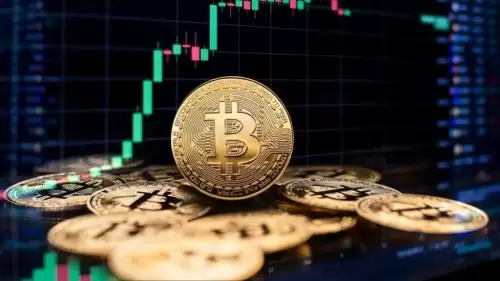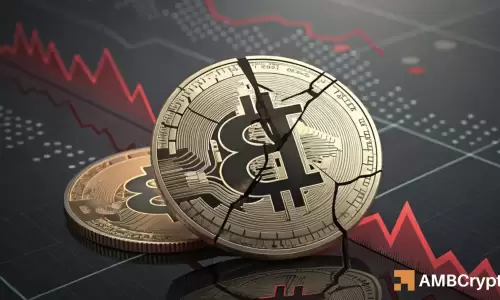 |
|
 |
|
 |
|
 |
|
 |
|
 |
|
 |
|
 |
|
 |
|
 |
|
 |
|
 |
|
 |
|
 |
|
 |
|
Articles d’actualité sur les crypto-monnaies
Stop Calling Bitcoin "Digital Gold" , Bitcoin Magazine
May 13, 2025 at 07:15 pm

Original article: Isaiah Austin , Bitcoin Magazine
Compiled by: Yuliya, PANews
Labeling Bitcoin as “digital gold” is a misunderstanding of this revolutionary form of currency. This statement simplifies Bitcoin into an asset with only the function of storing value, obscuring its deeper technological advantages and financial potential.
Analogy is a common way for humans to understand new things. Faced with the unprecedented concept of Bitcoin, people naturally tend to look for a reference model. Before the general public has a deep understanding of the underlying mechanism of Bitcoin, “digital gold” is undoubtedly an intuitive and easy-to-accept analogy. Bitcoin is scarce, universally used, and has a storage function, so it seems natural to be called “digital gold.”
This narrative has driven adoption at the institutional and sovereign level, and was even written into the first paragraph of President Trump’s executive order on the establishment of a strategic Bitcoin reserve: “Bitcoin is often referred to as ‘digital gold’ due to its scarcity and security.”
This is an undeniable achievement. However, if Bitcoin is to realize its true potential, this narrative must be updated.
Bitcoin is not “digital gold”.
To equate it with gold is to belittle a monetary innovation that has completely disrupted the traditional financial system. Bitcoin’s fundamental properties make gold’s proud qualities obsolete, while at the same time, it is faster, safer, and more decentralized than fiat currencies.
Scarcity and finiteness
The key reason why gold has long been a store of value is its scarcity. Over the past century, annual gold production has only increased by about 1% to 2%. The difficulty of exploration, coupled with high labor, equipment and environmental costs, makes large-scale expansion of production uneconomical.
This naturally occurring supply constraint has given gold currency status since 3000 BC: in ancient Rome, a high-end robe cost as much gold as a tailored suit would cost today, demonstrating its stable value.
However, in the era of Bitcoin, it is inappropriate to use assets with fluctuating supply as a measure of value. Bitcoin is not scarce, but “limited”. Its total supply is forever locked at 21 million and will not increase due to technological breakthroughs or cosmic mining.
Through mathematics and technology, for the first time, humans have a fixed total amount of tradable currency, the significance of which goes far beyond what “digital gold” can cover.
Differentiability
Although gold can be cut, it is hardly “highly differentiable.” This property is only achieved with saws, laser equipment, and precision scales. Therefore, gold is suitable for large transactions but difficult to use for daily payments.
At current market prices, 1 gram of gold is worth about $108. If you pay for a sandwich with gold, you have to scrape off a dime, which is obviously not feasible in reality.
Historically, humans have mitigated this problem by issuing gold coins with a defined metal content. However, this also opens the door to currency debasement.
For example, the Lydian stater coins of 600 BC were issued in Lydia (modern-day Turkey) and were originally struck in electrum (an alloy of gold and silver) with a gold content of about 55%.
After the conquest of the Persian Empire in 546 BC, gold coins were gradually adulterated with base metals such as copper to reduce the gold content. This practice led to a decrease in the actual value of the coins, and by the end of the 5th century BC, their gold content was only 30%-40%.
Gold cannot be differentiated as an asset, and this defect has prevented it from being effectively used for a long time in history. In order to conduct small transactions, citizens usually give gold to the government in exchange for 1:1 coins. However, this mechanism often leads to currency dilution and the collapse of social trust due to the manipulation of power by the elite.
In history, no monetary system based on gold has been able to avoid devaluation in the end. The actual demand for micro-transactions has forced the public to rely on paper money and small currencies issued by the state, thus losing control over wealth.
Bitcoin has achieved a fundamental breakthrough in this regard. Its smallest unit, "satoshi", is equal to 1/100 million of a bitcoin. Currently, 1 satoshi is worth about $0.001, and its differential power has surpassed that of the US dollar. Bitcoin transactions do not require the help of any institution or government intermediary, and users can always directly use the smallest unit of account to trade, making it a truly non-intermediary currency system.
Therefore, in terms of divisibility and unit of account, it is almost a joke to compare gold with Bitcoin.
Auditability
The last time the U.S. government formally audited its gold reserves was in 1
Clause de non-responsabilité:info@kdj.com
Les informations fournies ne constituent pas des conseils commerciaux. kdj.com n’assume aucune responsabilité pour les investissements effectués sur la base des informations fournies dans cet article. Les crypto-monnaies sont très volatiles et il est fortement recommandé d’investir avec prudence après une recherche approfondie!
Si vous pensez que le contenu utilisé sur ce site Web porte atteinte à vos droits d’auteur, veuillez nous contacter immédiatement (info@kdj.com) et nous le supprimerons dans les plus brefs délais.
-

- Velo Universe, Dex et Defi Security: naviguer dans l'avenir du trading décentralisé
- Aug 05, 2025 at 07:45 am
- Exploration de l'évolution des échanges décentralisés (DEX) en mettant l'accent sur l'univers Velo, la sécurité Defi et la transition vers des plateformes de trading transparentes centrées sur l'utilisateur.
-

- Le portefeuille Bitget révolutionne Solana avec des transactions sans gaz: une nouvelle ère pour Defi
- Aug 05, 2025 at 07:36 am
- Bitget Wallet conduit la charge pour rendre Solana plus accessible avec des transactions sans gaz, simplifiant Defi pour tout le monde. Découvrez comment cette innovation remodèle l'expérience utilisateur.
-

- Ozak Ai, Boom crypto et potentiel de retour sur investissement: est-ce la prochaine grande chose?
- Aug 05, 2025 at 07:30 am
- Plongez dans le potentiel d'Ozak Ai dans le boom de la cryptographie. Ses outils commerciaux alimentés par l'IA peuvent-ils fournir un retour sur investissement explosif? Nous explorons les tendances et les idées.
-

- Les ETF de Solana et la poursuite de tous les temps High: Sol est-il défini sur Soar?
- Aug 05, 2025 at 07:30 am
- Le buzz de Solana est de retour! La spéculation du FNB, la croissance du réseau et la manie de la pièce mème pourraient pousser Sol vers un nouvel ATH. Mais y a-t-il d'autres joueurs dans le jeu?
-

-

-

-

- Bitcoin, Michael Saylor et Stratégie: un mastodonte de transformation numérique
- Aug 05, 2025 at 07:01 am
- Explorez la stratégie de Bitcoin audacieuse de Michael Saylor, les avoirs massifs de Microstrategy et le paysage évolutif de l'adoption de la cryptographie d'entreprise. Wall Street se fait-il enfin?
-

- Les détenteurs de Bitcoin se préparent à la sortie du marché au milieu des signaux baissiers
- Aug 05, 2025 at 07:00 am
- Les détenteurs de bitcoins à long terme montrent des signes de sortie du marché en tant que statistiques clés flash les signaux baissiers, suggérant une correction potentielle malgré des prix élevés.





























































